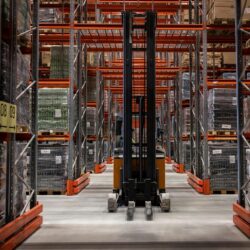Understanding Bonded Warehouses: A Comprehensive Guide

In the realm of global commerce, bonded warehouses stand as pivotal entities facilitating the movement of goods across borders while offering significant advantages to businesses engaged in international trade
These warehouses serve as secure storage facilities where imported goods can be housed without immediate payment of customs duties and taxes. In this article, we will dicuss explore the functions, benefits, and key considerations of bonded warehousing.
What is a Bonded Warehouse?
A bonded warehouse is a specially designated facility authorized by customs authorities to store imported goods without requiring immediate payment of duties and taxes.
Positioned strategically near ports, airports, or border crossings, bonded warehouses provide a crucial link in the supply chain, allowing for the temporary storage of goods until they are ready for distribution or further processing.
Under the supervision of customs authorities, goods stored within bonded warehouses are subject to stringent regulatory oversight until they are released for domestic consumption, re-exportation, or other approved purposes. That’s why you should always choose a reliable customs broker that can take care of all these documents.
Functions of Bonded Warehouses
Bonded warehouses fulfill several critical functions within the global trade marketplace. First and foremost, they enable importers to defer the payment of customs duties, providing valuable flexibility in managing cash flow and reducing upfront costs associated with importing goods.
They also facilitate compliance with import regulations and customs procedures, ensuring that goods are stored and handled in accordance with legal requirements.
Another extra service that bonded warehouses offer are value-added services such as repackaging, labeling, and quality inspection. This allows importers to customize their inventory to meet market demands.
Furthermore, bonded warehouses serve as pivotal hubs for re-exportation, enabling goods to be stored temporarily before being shipped to other countries without incurring additional duties and taxes.
Benefits of Utilizing Bonded Warehouses
The utilization of bonded warehouses offers a lot of benefits for businesses engaged in international trade. One of the most significant advantages is the cost-saving potential afforded by deferring customs duties and taxes, thereby improving cash flow and reducing the financial burden on importers.
Unlike regular warehouses, bonded warehouses provide unparalleled flexibility in managing inventory levels and responding to fluctuations in market demand, allowing businesses to adapt swiftly to changing circumstances.
By storing goods inside bonded warehouses, importers can mitigate the risk of customs penalties and delays, ensuring compliance with import regulations and trade policies.
Types of Bonded Warehouses
Bonded warehouses encompass various types, each tailored to meet specific industry requirements and storage needs.
· Public Bonded Warehouses: Public bonded warehouses are operated by third-party logistics providers and offer storage services to multiple importers and exporters. These warehouses are licensed by customs authorities and adhere to strict regulatory standards.
· Private Bonded Warehouses: Private bonded warehouses are owned and operated by individual companies or manufacturers to store their imported raw materials or finished goods. These warehouses provide greater control over inventory management and security.
· Free Trade Zones (FTZs): Free trade zones are designated areas within a country where goods can be imported, stored, or processed without payment of duties and taxes. FTZs offer additional benefits such as streamlined customs procedures, regulatory exemptions, and access to global markets.
· Bonded Manufacturing Warehouses: Bonded manufacturing warehouses allow companies to import raw materials duty-free for the production of finished goods. These facilities are ideal for manufacturers looking to leverage cost-saving opportunities and supply chain efficiencies.
Key Considerations When Using Bonded Warehouses
While bonded warehouses offer numerous advantages, businesses involved in the supply chain industry should consider the following factors:
· Customs Compliance: Ensure compliance with import regulations, documentation requirements, and customs procedures to avoid penalties and delays.
· Inventory Management: Implement robust inventory management practices to track goods accurately, minimize stockouts, and optimize warehouse utilization.
· Security Measures: Invest in security measures such as surveillance cameras, access control systems, and inventory tracking technologies to safeguard against theft, damage, or loss of goods.
· Insurance Coverage: Obtain adequate insurance coverage to protect against potential risks and liabilities associated with storing goods in bonded warehouses.
· Cost Analysis: Conduct a thorough cost-benefit analysis to assess the financial implications of using bonded warehouses, including storage fees, handling charges, and customs duties.
Bonded Warehouses Helps Businesses Optimize Their Supply Chain
In conclusion, bonded warehouses play a pivotal role in facilitating international trade and optimizing supply chain efficiency. By providing secure storage facilities for imported goods, bonded warehouses enable businesses to defer customs duties, reduce costs, and enhance operational flexibility.
Understanding the functions, benefits, and key considerations associated with bonded warehouses, can help businesses optimize their global logistics operations and capitalize on growth opportunities in the dynamic world of international trade.














